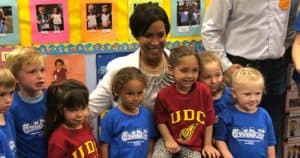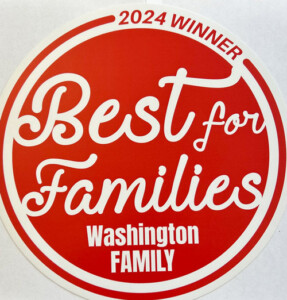Washington, D.C.: The Cradle of the Global Citizen
 On May 11, 2018, CommuniKids was informed that it had the winning bid on a facility located at building 41 of the University of the District of Columbia (UDC). This recently renovated facility was offered by public bidding process to high quality early childhood educational providers as part of Mayor Bowser’s “Thrive by Five” initiative. This initiative seeks to create approximately 1,000 new early childhood seats to meet the needs of growing families in Washington, DC, by offering low cost rentals on District-owned facilities to private early childhood education providers. The opening of the UDC location as a satellite of CommuniKids current DC center will allow us to provide high quality dual language early childhood services to 140 students in Washington, DC. It also sets the table for a working partnership with UDC’s early childhood education program to have CommuniKids help train prospective educators in its groundbreaking dual language Early Childhood Second Language(ECSL) educational method. We believe that taking advantage of incentive programs like “Thrive by Five” could help scale dual language education programs throughout the entire DC region.
On May 11, 2018, CommuniKids was informed that it had the winning bid on a facility located at building 41 of the University of the District of Columbia (UDC). This recently renovated facility was offered by public bidding process to high quality early childhood educational providers as part of Mayor Bowser’s “Thrive by Five” initiative. This initiative seeks to create approximately 1,000 new early childhood seats to meet the needs of growing families in Washington, DC, by offering low cost rentals on District-owned facilities to private early childhood education providers. The opening of the UDC location as a satellite of CommuniKids current DC center will allow us to provide high quality dual language early childhood services to 140 students in Washington, DC. It also sets the table for a working partnership with UDC’s early childhood education program to have CommuniKids help train prospective educators in its groundbreaking dual language Early Childhood Second Language(ECSL) educational method. We believe that taking advantage of incentive programs like “Thrive by Five” could help scale dual language education programs throughout the entire DC region.
The need to scale dual language educational programs is pressing as the demand for global education programs is booming throughout the Capital Region. CommuniKids is part of an expanding number of educational institutions that are working to meet the demand for programs heralding the development of multilingualism and cross-cultural skills as an essential part of their mission. For decades Oyster-Adams Bilingual School and Washington International School have been carrying out global education programs in the DC area. These established schools have recently been joined by globally minded CommuniKids Preschool, internationally focused charter schools like the Yu-Yin Academy, Elsie Whitlow Stokes, Mundo Verde, and District of Columbia International and private schools such as Maryland International Day School in Prince George’s County.
Still, we are barely scraping the surface of the local potential, and much more needs to be done to ensure access to high quality dual language immersion programs. The DC Language Immersion Project has found that DC’s seven dual language immersion charter schools account for 30% of the total number of student waitlists at all DC Public Charter Schools. Indeed, over 1/3 of the growth in applications for DC Public Charter Schools is due to interest in dual language programs.

To help meet the demand and coordinate dual language immersion services, DC Councilmembers David Grosso and Robert White have called to fund an office of Bilingual Education that would support and expand bilingual education throughout the early childhood to workforce continuum, and while momentum for this is building, as of today, the funding has not materialized in the District’s FY’19 proposed budget.
Mayor Bowser’s budget, however, provides an opportunity to immediately expand the reach of multilingual global education. The Mayor’s “Thrive by Five” initiative dedicated over $12 million to aggressively expand the number of early childhood education seats in the District. Global education programs should endeavor to take advantage of these funds to expand early childhood language immersion programs to all quadrants of the city. DC is a global city; in order to be successful and compete in the global marketplace our children need to have the disposition and skills to relate positively with people of all different social, cultural, religious and linguistic backgrounds. Multilingualism is key to this effort and it needs to be an essential outcome of a global education. That is why it is so important for dual language education to start early so it may serve as the foundation for comprehensive global education. We believe that CommuniKids’ partnership with UDC can help create a foundation that can lead to a city-wide dual language global education track from preschool to college. Community based organizations must push for the needed inter-agency coordination that the proposed Office of Bilingual Education would bring, and assertively take advantage of the resources available in the early childhood education space to make global education a priority. By cultivating the resources available we may be able to scale dual language global education programs to the rest of the Nation’s Capital and beyond. By building a strong network of dual language global early childhood educational centers the Nation’s Capital has the chance to become the cradle of global citizenship.

